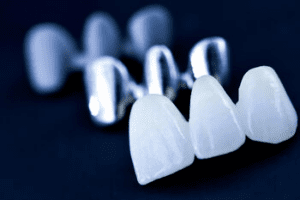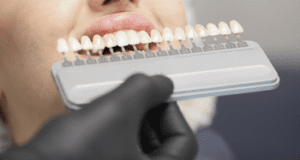Have you ever wondered how celebrities manage to flash that perfect, flawless smile? Much of the magic lies in the realm of cosmetic dentistry, specifically with dental veneers. But did you know there are different types of veneers available?
Understanding Dental Veneers types of veneers
Dental veneers, sometimes referred to as ‘laminates’, are customised thin shells to cover the front surface of teeth, enhancing their appearance. They can rectify various cosmetic concerns, such as chipped or broken teeth, misshapen teeth, or severe teeth discolouration. These veneers bond to the front teeth surfaces, transforming them into a picture-perfect set.
How Veneers are Applied to the Front Teeth
Veneers are thin shells custom-crafted from porcelain or composite resin. They are meticulously designed to match a patient’s natural teeth in colour and shape.
During the application process, a dentist slightly scuffs the tooth’s front surface and then bonds the veneer securely to enhance the tooth’s appearance.
The Evolution of Veneer Materials and Techniques
 Over the decades, the field of cosmetic dentistry has seen significant advancements, and dental veneers have certainly not been left behind.
Over the decades, the field of cosmetic dentistry has seen significant advancements, and dental veneers have certainly not been left behind.
Initially, when dental veneers debuted in the cosmetic scene, they were primarily utilised by actors looking for a short-term solution to achieve that perfect Hollywood smile. These early veneers were less durable and would often dislodge after a short period.
Fast forward to today, and thanks to the evolution in veneer materials and bonding techniques, they have transformed from a temporary cosmetic fix to a long-lasting and durable cosmetic solution.
For instance, the introduction of stronger bonding agents ensures that once a veneer is affixed to a tooth, it can remain there for many years, often upwards of a decade or more, with the right care.
Modern types of veneers also cater to diverse aesthetic needs. From ultra-thin veneers requiring minimal to no tooth preparation to those designed specifically for anterior or posterior teeth, the variety ensures that every individual can find a solution personalised to their specific needs.
Besides, the colour-matching techniques have improved tremendously. Today’s veneers can be so seamlessly matched to surrounding natural teeth that an onlooker can’t discern between the veneer and the natural tooth.
Moreover, the resilience of modern veneers to staining agents like coffee, tea, and red wine means that wearers can enjoy their favourite foods and drinks without the constant worry of staining.
This is especially noteworthy for coffee lovers and wine aficionados, who previously had to compromise on their indulgences to maintain the sheen of their cosmetic teeth.
In the spectrum of oral health solutions, dental veneers have thus carved out a unique niche, offering both functional benefits and aesthetic excellence.
Their evolution is a testament to the relentless pursuit in cosmetic dentistry to merge science with artistry, giving individuals the confidence of a radiant smile.
Types of Veneers and Their Unique Characteristics
Porcelain Veneer
Traditional porcelain veneers, sometimes called porcelain laminate veneers, are among the most popular types in the cosmetic dentistry realm. Crafted from durable, high-quality ceramic, these permanent veneers replicate the translucent nature of natural teeth enamel.
Advantages:
- Stain-Resistant: Unlike composite resin, porcelain is resistant to staining, ensuring a brighter smile for longer.
- Durability: With proper maintenance, their life spans over a decade.
- Natural Appearance: Meticulously designed by a dental lab technician, they closely resemble the natural tooth structure.
Considerations:
- Tooth Preparation: Enamel removal is essential for fitting porcelain veneers. This tooth preparation may lead to increased tooth sensitivity.
- Cost: Porcelain veneers usually have a higher upfront cost than other veneers, but their durability often justifies the investment.
Composite Resin Veneer
Unlike porcelain veneers, composite resin veneers are directly sculpted onto your teeth. A dental professional meticulously moulds the veneer using composite resin, usually in a single appointment.
Advantages:
- Less Enamel Removal: These veneers require minimal tooth preparation, ensuring most of the natural tooth enamel remains untouched.
- Cost-Efficient: Composite veneers typically have a lower initial cost than their porcelain counterparts.
Considerations:
- Durability: They may not last as long as porcelain veneers, but they can serve well for several years with proper care.
- Staining: Composite resin isn’t as stain-resistant as porcelain, so these veneers might require replacement sooner, especially if you enjoy teeth-staining habits like drinking red wine or coffee.
Temporary Veneers
- Temporary veneers, as the name implies, are short-term solutions that are not crafted to fit an individual’s front teeth permanently. These instant veneers serve as an interim dental treatment while waiting for traditional veneers and are typically made from composite materials.
Advantages:
- Speed: Being prefabricated, they offer a swift solution before permanent veneers are ready.
- Cost: Generally more cost-effective than permanent veneers.
Considerations:
- Fit and Look: Since they’re not custom-made, they may not deliver the perfect aesthetic or fit that one might expect from their permanent counterparts.
Choosing the Right Type of Veneer
How many veneers you wish to have, the cosmetic teeth concerns you’re addressing, and your budget will influence your choice. For instance, if you’re looking for a long-lasting, stain-resistant option and are prepared for a more invasive procedure, traditional porcelain veneers might be your best bet. On the other hand, if you prefer a less invasive approach and are on a tighter budget, composite resin veneers could be ideal.
No matter the type of veneer, maintaining excellent oral health is crucial. Regular check-ups, avoiding hard foods that could chip the veneers, and practising proper oral hygiene can ensure your veneers stay in prime condition.
Temporary Veneers and Their Role
 While waiting for your permanent veneers, your dentist may place temporary veneers to protect your prepared teeth.
While waiting for your permanent veneers, your dentist may place temporary veneers to protect your prepared teeth.
These temporary restorations ensure you aren’t left with a compromised smile while your custom-made veneers are being crafted in a dental lab.
Understanding the Procedure Behind Dental Veneers
The application of dental veneers isn’t just about attaching a custom-made shell to your teeth. It’s a meticulous process that requires both expertise and precision.
Consultation
This initial stage is crucial. It’s where you express your desires, and the dental professional evaluates the viability of veneers for your specific case. They might take X-rays or even make impressions of your mouth and teeth.
Tooth Preparation
A small amount of enamel, roughly equal to the thickness of the veneer to be added, is removed. This procedure might involve administering a local anaesthetic to minimise discomfort. Afterwards, an impression or mould of the tooth is taken. This model is given to the dental lab, where the veneer is crafted – a process that could take several weeks.
Your dentist might apply temporary veneers, also known as snap on-veneers or removable veneers until your permanent ones are ready.
Bonding Process
Before permanently bonding the dental veneer to your tooth, your dental professional will ensure it fits correctly. They might trim the veneer to achieve the perfect fit. The tooth is then cleaned, polished, and shaved, allowing for a robust bonding process. Special cement is applied to the veneer, which is then positioned on the tooth. Once properly positioned, a special light beam activates chemicals in the cement, making it harden rapidly.
Why Choose Veneers Over Other Cosmetic Solutions?
Veneers, unlike other dental solutions, offer both cosmetic and functional advantages:
- Customisation: Every veneer, especially porcelain and composite resin veneers, is uniquely designed to fit an individual’s tooth. This ensures they blend seamlessly with surrounding teeth, both in shape and colour.
- Stain Resistance: Porcelain veneers, in particular, resist stains better than natural teeth, making them an excellent solution for those keen on maintaining a brighter smile.
- Less Invasive: Veneers are less invasive compared to dental crowns. They require less enamel removal and are thus deemed a more conservative approach to changing a tooth’s colour and shape.
- Durability: With proper care, dental veneers can last between 7 and 15 years, after which they’ll need replacement.
Caring for Your Veneers
The longevity and appearance of your veneers largely hinge on how you care for them:
- Oral Hygiene: Much like your natural teeth, veneers should be brushed and flossed daily. While they might be resistant to decay, the tooth underneath isn’t.
- Avoid Hard Foods: While veneers are durable, they aren’t indestructible. Avoid biting on hard objects or foods to prevent chipping or breaking them.
- Regular Dental Check-ups: Ensure you have regular dental check-ups. This not only allows the professional to evaluate the state of your veneers but also ensures your entire oral health is in check.
Potential Side-effects and Risks
While permanent veneers are widely deemed safe, they come with a few potential side effects:
- Tooth Sensitivity: Due to the enamel removal process, your tooth may become temporarily sensitive to hot and cold temperatures.
- Irreversible Procedure: The enamel removal is a permanent process. This means that once you opt for veneers, there’s no turning back.
- Mismatched Colour: Over time, your natural teeth might discolour, making the veneer stand out.
- Potential for Damage: Veneers can chip or crack under pressure, requiring replacement.
Veneers vs. Other Dental Treatments
While veneers offer a transformative solution, how do they stack up against other treatments?
- Teeth Whitening: Teeth whitening is a cosmetic dentistry procedure that lightens teeth and helps remove stains and discolouration. However, its effects aren’t as long-lasting as veneers, and not all teeth discolourations respond well to whitening.
- Dental Crown: While dental crowns offer comprehensive coverage by encapsulating the whole tooth, they require a more extensive procedure, often involving significant reshaping of the tooth. They are ideal for situations involving severely decayed or damaged teeth where the structural integrity of the tooth needs restoration. On the other hand, veneers provide an aesthetic solution without the need for such extensive tooth alteration.
Factors Influencing the Cost of Veneers
Dental veneers, given their cosmetic nature, can be a significant investment. Several factors can influence their cost:
- Material Type: Traditional porcelain veneers are generally pricier than composite resin veneers due to their durability and natural appearance.
- Dentist’s Skill: A dentist’s expertise in crafting the veneer can influence its cost.
- Geographic Location: The cost can vary depending on where you’re getting the procedure done. Metropolitan areas, for instance, might charge more compared to non-metropolitan areas.
- Number of Veneers: The more veneers you require, the higher the overall cost. However, some clinics might offer discounts for a full set.
Conclusion: Your Path to a Beautiful Smile
Veneers offer a cosmetic solution for those seeking to enhance their smile, masking imperfections ranging from discolouration to misalignment. With the various types of veneers available today, achieving a smile makeover is more accessible than ever.
If you’re considering veneers or would like professional advice on cosmetic dentistry to address your specific concerns, remember that a skilled dentist can guide you best. With their expertise, you can decide on a treatment that aligns with your desires and needs.
Ready for a transformative journey to a radiant smile? Contact Dental 266 today, and let our team of experts help you choose the perfect veneer solution for your beautiful smile.
References:
https://mypenndentist.org/dental-tips/2022/03/07/types-of-veneers/#:~:text=In%20general%2C%20there%20are%20four,results%20vary%20significantly%20among%20them.

